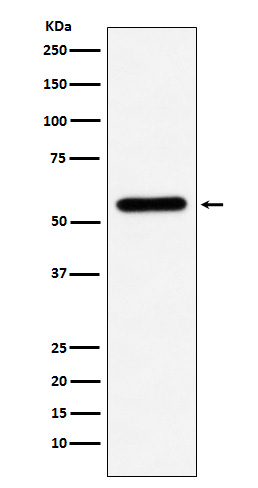
| WB | 咨询技术 | Human,Mouse,Rat |
| IF | 1/20-1/50 | Human,Mouse,Rat |
| IHC | 咨询技术 | Human,Mouse,Rat |
| ICC | 技术咨询 | Human,Mouse,Rat |
| FCM | 1/20-1/100 | Human,Mouse,Rat |
| Elisa | 咨询技术 | Human,Mouse,Rat |
| Aliases | ACAT; CE 1; CEH; CES1; CES2; CESDD1; Egasyn; ES-HTEL; ES-x; Es22; Esterase 22; hCE 1; HMSE; HMSE1; REH; SES1; TGH; Triacylglycerol hydrolase; ;CES1 |
| WB Predicted band size | Calculated MW: 63 kDa ; Observed MW: 55 kDa |
| Host/Isotype | Rabbit IgG |
| Antibody Type | Primary antibody |
| Storage | Store at 4°C short term. Aliquot and store at -20°C long term. Avoid freeze/thaw cycles. |
| Species Reactivity | Human,Mouse,Rat |
| Immunogen | A synthesized peptide derived from human CES1 |
| Formulation | Purified antibody in PBS with 0.05% sodium azide,0.05% BSA and 50% glycerol. |
+ +
以下是3篇关于Liver Carboxylesterase 1(CES1)抗体的参考文献及其摘要概括:
---
1. **文献名称**:*Carboxylesterase 1 (CES1) antibody validation for enzyme localization studies in human liver*
**作者**:Yang J. et al.
**摘要**:该研究验证了多种CES1特异性抗体在人体肝组织中的免疫组化应用,证实了其与酶活性分布的高度一致性,为肝细胞中CES1代谢功能的精准定位提供了可靠工具。
---
2. **文献名称**:*Species-specific differences in hepatic carboxylesterase 1 expression and antibody cross-reactivity*
**作者**:Fukami T., Yokoi T.
**摘要**:通过比较人类、小鼠和大鼠肝组织中的CES1蛋白表达,发现部分抗体存在物种交叉反应性,强调了选择物种特异性抗体在跨物种代谢研究中的重要性。
---
3. **文献名称**:*A monoclonal antibody-based ELISA for quantifying human liver carboxylesterase 1 in clinical samples*
**作者**:Shi D. et al.
**摘要**:开发了一种基于单克隆抗体的ELISA检测方法,用于定量人血清和肝组织中的CES1水平,证明了其在评估个体化药物代谢能力中的潜在临床应用价值。
---
4. **文献名称**:*Liver carboxylesterase 1 antibody reveals altered expression in non-alcoholic fatty liver disease*
**作者**:Xu S.S. et al.
**摘要**:利用CES1特异性抗体发现,非酒精性脂肪肝患者肝组织中CES1蛋白表达显著下调,提示其可能通过影响脂质代谢参与疾病进展。
---
以上文献涵盖抗体验证、物种特异性、检测方法开发及疾病关联研究,可根据需求进一步检索PubMed或SciFinder获取全文。
Liver carboxylesterase 1 (CES1) is a key enzyme predominantly expressed in the liver, playing a critical role in hydrolyzing a wide range of endogenous and exogenous substrates, including lipid metabolites, drugs, and environmental toxins. As a member of the carboxylesterase family, CES1 is involved in drug metabolism, detoxification, and lipid homeostasis, making it a focal point in pharmacological and toxicological studies. Antibodies targeting CES1 are essential tools for investigating its expression, localization, and function in both physiological and pathological contexts.
These antibodies are typically produced using immunogens derived from specific regions of the CES1 protein, such as conserved peptide sequences or recombinant protein fragments. They enable detection of CES1 in various applications, including Western blotting, immunohistochemistry (IHC), and immunofluorescence (IF), aiding in studies of liver diseases (e.g., non-alcoholic fatty liver disease), drug metabolism variability, and cancer (where CES1 expression may influence chemotherapeutic efficacy). Validation often involves knockout cell lines or tissue samples to confirm specificity, as cross-reactivity with other carboxylesterases (e.g., CES2) must be ruled out. Research using CES1 antibodies has highlighted its role in lipid dysregulation, viral infections, and personalized medicine, particularly in understanding genetic polymorphisms affecting drug responses.
×